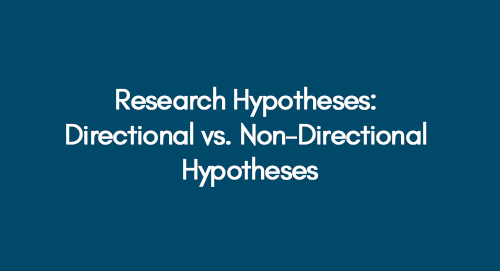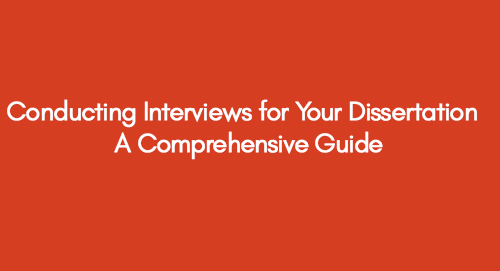
Is AP Psychology Hard? Exploring the Challenges and Rewards
February 21, 2024
280+ Quantitative Research Titles and Topics
February 26, 2024A research hypothesis is a statement that predicts or expects a relationship between variables, and it is tested through research. Researchers create hypotheses by reviewing existing literature, theories, or evidence. A hypothesis guides the research process and predicts study outcomes.
What is a Hypothesis in a Dissertation?
Types of Hypothesis
There are two main types of hypotheses in research:
Null Hypothesis (H0)
The null hypothesis is the default assumption in statistical analysis that there is no significant relationship or effect between the variables being studied. It suggests that any observed differences or relationships are due to chance.
Alternative Hypothesis (Ha or H1)
The alternative hypothesis proposes a significant relationship or effect between variables, contradicting the null hypothesis. It reflects the researcher's expectations based on existing theories or observations.
What is Directional Hypotheses?
A directional hypothesis is a type of hypothesis that is used to predict a specific change or outcome in a research study. It is typically used when researchers have a clear idea of the direction in which they expect their results to go, either an increase or decrease, and want to test this prediction. By making a directional hypothesis, researchers can focus their research efforts and design studies that are more likely to uncover meaningful results. In essence, a directional hypothesis is a statement that predicts the direction of the change that is expected to occur between two groups or variables that are being investigated.
Examples of Directional Hypothesis
Example 1: Online versus Traditional Classroom Learning
For instance, consider a study comparing the average study time of college students in online courses versus those in traditional classroom settings. Drawing on prior research indicating that online learning might lead to reduced engagement, a potential directional hypothesis could be: "Students enrolled in online classes will spend fewer weekly study hours than those in traditional classrooms."
In this scenario, our hypothesis presents a clear expectation—that the average number of weekly study hours among online learners will be lower than that of traditional learners. If the actual findings reveal no significant difference or even higher study times among online learners, then our hypothesis would be refuted.
Example 2: Carbon Dioxide Levels and Global Warming
A directional hypothesis in this scenario would propose a specific change in direction between these two variables. For instance, a directional hypothesis might state that as carbon dioxide levels increase, global temperatures will also rise. This hypothesis suggests a causal relationship between the increase in CO2 levels and the phenomenon of global warming, indicating a direction of change in global temperatures corresponding to changes in CO2 levels.
What is a Non-Directional Hypotheses?
In scientific research, a non-directional hypothesis, or null hypothesis, is a statement that suggests the absence of a relationship or difference between the variables being studied. This type of hypothesis is used to test the validity of a research question by assuming that there is no significant effect or relationship between the variables under investigation. The null hypothesis is typically tested against an alternative hypothesis, which proposes that there is a significant effect or relationship between the variables. If the null hypothesis is rejected, it means that there is enough evidence to suggest that the alternative hypothesis is true, and the variables are indeed related or different from each other.
Non-Directional Hypothesis Example
Example: Is there a difference in anxiety levels between students who receive traditional classroom instruction and those who participate in online learning?
In this non-directional hypothesis, researchers are interested in understanding if there's a disparity in anxiety levels between students who are taught in traditional classrooms versus those who learn online. The non-directional hypothesis posits that there won't be any notable variance in anxiety levels between the two groups. This means that the researchers are not predicting whether one group will have higher or lower anxiety levels; rather, they are exploring if there's any difference at all.
Directional vs. Non-Directional Hypotheses in Research
Both directional and non directional hypothesis have their place in research, and choosing the appropriate type depends on the research question being investigated. Researchers can use directional or non-directional hypotheses in their studies, depending on their specific expectations about the relationship between variables. A directional hypothesis predicts a specific direction of change, while a non-directional hypothesis predicts that there will be a difference between groups or conditions without specifying the direction of that difference. It's important to understand the difference between these types of hypotheses to conduct rigorous and insightful research. Directional hypotheses are useful when researchers want to test a specific expectation about the relationship between variables, while non-directional hypotheses are more appropriate when researchers simply want to test if there is any difference between groups or conditions.
Connect With Writer Now
Discuss your requirements with our writers for research assignments, essays, and dissertations.
How to Write an Effective Hypothesis in Research?
Writing an effective hypothesis involves several key steps to ensure clarity, testability, and relevance to the research question. Here's a guide on how to write an effective hypothesis:
- Identify the Research Question: Start by clearly defining the research question or problem you want to investigate. Your hypothesis should directly address this question.
- State the Null Hypothesis: The null hypothesis (H0) is a statement that there is no relationship or effect between the variables being studied. It serves as the default assumption and is typically stated as the absence of an effect or difference.
- Formulate the Alternative Hypothesis: The alternative hypothesis (H1 or Ha) is the statement that contradicts the null hypothesis and suggests that there is a relationship or effect between the variables. It reflects what you expect to find in your research.
- Make it Testable: Your hypothesis should be testable through empirical observation or experimentation. This means that there must be a way to collect data or evidence to support or refute the hypothesis.
- Be Specific and Clear: Clearly state the variables involved and the expected relationship between them. Avoid vague or ambiguous language to ensure that your hypothesis is easy to understand and interpret.
- Use Quantifiable Terms: Whenever possible, use quantifiable terms or measurable variables in your hypothesis. This makes it easier to collect data and analyze results objectively.
- Consider the Scope: Ensure that your hypothesis is focused and specific to the research hypothesis at hand. Avoid making broad generalizations that are difficult to test or validate.
- Revise and Refine: Once you've drafted your hypothesis, review it carefully to ensure accuracy and coherence. Revise as needed to clarify any ambiguities or inconsistencies.
- Seek Feedback: Consider seeking feedback from colleagues, mentors, or advisors to ensure that your hypothesis is well-formulated and logical.
Need Help with Academic Writing? Get a Response within 24 Hours!
Conclusion
In conclusion, directional hypotheses predict whether variables will increase or decrease, providing a definite expectation about the direction of the relationship under investigation. Non-directional hypotheses, on the other hand, only claim that there is a difference between variables without specifying the direction of the change, leaving it open to any possibility. Both types of hypotheses play an important role in guiding research investigations and developing testable predictions.
Free Online Plagiarism Checker For Students
We will email you the report within 24 hours.
Upload your file for free plagiarism

Get an Immediate Response
Discuss your custom requirements with our writers




























